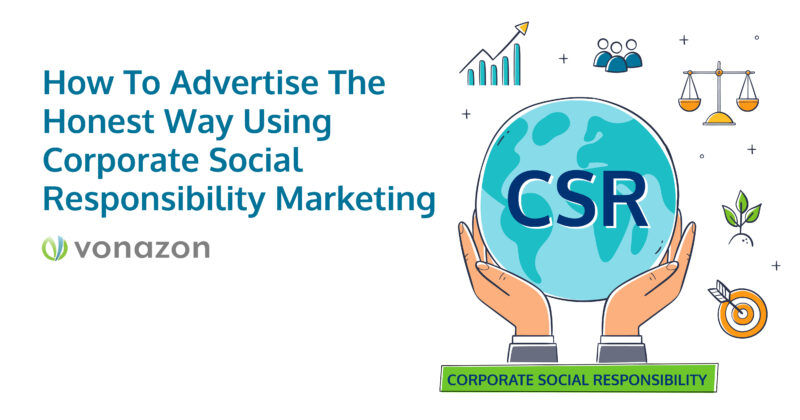How to Advertise the Honest Way Using Corporate Social Responsibility Marketing
Corporate social responsibility is no longer a nice buzzword to sprinkle into your product messaging. Consumers expect better ethics and corporate social responsibility from businesses they choose to support financially. Employees are beginning to ask the companies they work for to take a stand on important issues. Instead of focusing solely on profits, businesses must prioritize giving back to the communities they serve and taking a stand on social and environmental issues. Practicing corporate social responsibility doesn’t mean you have to change everything about your business. There are countless ways to integrate corporate social responsibility marketing practices into your strategy that increase employee engagement, improve talent acquisition, and benefit your bottom line.
Identifying where to begin making ethical and responsible changes can be difficult but caring about “how” you reach success matters for today’s culture. We’ve prepared a helpful how-to guide for corporate social responsibility marketing so you can safeguard your company’s future and help make a real difference.
What is corporate social responsibility?
Corporate social responsibility (CSR) is a business model that challenges companies to increase profits while helping to make the world better with sustainable choices. The primary purpose of CSR is to convince corporations to recognize the cost society pays for their actions. How can they balance stakeholder expectations while providing positive social value? In response, many corporations have turned towards four sustainable causes that impact our
- Environmental
- Philanthropy
- Ethical
- Economic
Environmental CSR uses innovation to market ways for reducing environmental impact. Philanthropy CSR involves promoting and hosting charities to fund a cause that benefits people’s lives. Ethical CSR is used by companies to highlight fair business practices and stand against inhumane ones like child labor. Economic CSR is centered around social financial equity and often involves companies making financial sacrifices to ensure the standard of living for their workforce remains comfortable.
Why your marketing strategies need CSR
Corporate social responsibility marketing streamlines profits by attracting like-minded consumers. CSR marketing extends your brand’s reach to customers who want to feel like they’re making a real change when buying your product or service. Many companies have chosen to accomplish this by adopting sustainable business practices or donating a certain amount of profits to a just cause. Reliable corporate social responsibility marketing plans require linking your product or service to relevant social issues. Your efforts could range from adopting recyclable packaging to drawing attention to social issues like food insecurity. The larger the impact, the greater your brand reputation becomes.

5 competitive benefits of socially responsible marketing
For decades organizations viewed strategic corporate social responsibility as an extravagant expense they couldn’t afford. This misconception stems from the outdated idea that CSR works against the expectation of shareholders to prioritize a company’s bottom line. The truth is that profit and CSR practices aren’t mutually exclusive.
As proof, we’ll examine five tangible ways your bottom line can benefit from the right corporate social responsibility marketing strategy:

Attract talent while increasing employee engagement
Employees are a company’s most important asset, but attracting, motivating, engaging, and retaining top-tier talent has become challenging. Talent doesn’t see ethics and corporate social responsibility as an added benefit anymore—CSR is a necessity. 47% of millennials care more about what kind of social causes a CEO supports than their wages. These employees take pride in their work when companies align a transparent purpose with their core values. When employers offer chances to volunteer or give feedback, new talent becomes more motivated to stay by a sense of community.

Improve cost savings
Contrary to what you might think, CSR strategies save money. CSR practices prevent higher costs by improving employee retention using job satisfaction and motivation, reducing burnout turnover rates, and eliminating the expense of training new staff. Going green might cost more initially, but customers care as much as your employees do about making sustainable efforts. Customers are willing to pay more for your products or services if your social efforts resonate with their personal values.

Boost brand awareness and corporate reputation
Associating your brand with responsible choices attracts customers who may not have known you existed beforehand. People are more conscious of social issues today and want to contribute to positive changes. Companies who understand this desire can turn it into an opportunity to make a difference while creating revenue. Encourage innovation by creating socially responsible products or advertising energy-efficient services. You can then differentiate your brand from competitors who have yet to take a stand on these problems, giving you a market advantage.

Support community outreach
Word-of-mouth is one of the best ways to retain customers and boost brand loyalty. It’s a free, genuine, and honest representation of your brand that money couldn’t buy. You earn it by supporting your communities and giving back. Improving the lives of your customers humanizes your brand, making you part of these communities. Happy customers become brand ambassadors for your products. These loyal customers then grant you authenticity by liking or sharing your acts of community engagement with their followers online.

Generate investment and press opportunities
Philanthropy that balances the need for greater financial returns with community support forms a transparent public image. Customers love stories about companies contributing to a cause, which attracts positive media coverage. Corporate social responsibility marketing around charitable causes displays accountability and raises a brand’s reputation, creating new growth opportunities. In fact, 73% of investors view CSR lead companies with great PR images as a sign of safe investments.
Best practices for CSR marketing
With the correct best practices, you can make instilling ethics and corporate social responsibility into your marketing strategy easier. Start by defining what CSR means to your company and aligning that purpose with the vision of your marketing strategy. Transparency is critical, so seek socially responsible investors (SRIs) who can help you set goals, commit to them, and openly share those results. Next, start taking in feedback from your employees. Ask them what changes they’d like to see CSR produce and the types of social causes that matter to them.
Finally, create CSR benchmarks by reviewing the actions of ethical companies in your industry. Understanding why they became successful using this pathway will inform you on what choices you need to make. Above all else, you want to avoid actions that might damage your brand more than help, such as uch as greenwashing.
Conclusion
As we discussed, corporate social responsibility marketing isn’t something businesses can afford to ignore in today’s culture. The facts don’t lie. Consumers want to fund organizations dedicated to making the world a better place through social or environmental changes. The demand for socially responsible advertising exists. The next generation of talented employees would rather work for a company whose CEO takes an active role in supporting social issues they’re passionate about pushing today. Companies with the right CSR strategy linking their purpose and vision towards these new opportunities stand to benefit their bottom line, improve their reputation, and help contribute to the greater good.
Contact the experts at Vonazon for further guidance on corporate social responsibility marketing.
Account Executive
Vonazon Inc.

Vonazon can guide you through the process of creating fun and effective short form videos that are unique to your brand. We can also help you create campaigns around your videos that deliver results, grow your brand’s social media presence, and produce more leads.
Contact us today to begin your short form video journey.








